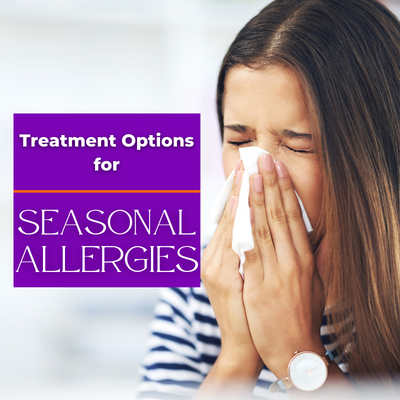Seasonal allergies affect people all year long. Sometimes, seasonal allergies go unnoticed, while others can be life-threatening. Seasonal allergies are a response from the body’s immune system overreacting to indoor and outdoor stimulants. Allergies are not a one size fits all for patients. Symptoms of seasonal allergies include:
- Runny, stuffy or itchy nose
- Itchy and watery eyes
- Sneezing
- Nasal drip
- Sore throat
At RISE Direct Primary Care of Casper, Wyoming, we look at each patients needs to provide a plan for seasonal allergy treatment options.
Natural Therapies for Seasonal Allergies
Natural therapies may provide allergy relief. There are several herbs and foods that can help alleviate allergy symptoms. Citrus fruits like lemons, limes and oranges are high in antioxidants and vitamin C. Diffusing citrus fruit essential oils or eating the peels are a great way to improve allergy symptoms. Nasal allergies often affect sleep. Also, studies indicate that spirulina, an herbal remedy, can improve sleep in patients experiencing seasonal allergies.
Avoid Seasonal Allergies
Avoiding seasonal allergies can be challenging if you are not sure what you are allergic to. If you know of specific allergens that cause your symptoms to worsen, simply avoid those allergens. Not sure what you are allergic to? In severe allergy cases, your doctor may recommend allergy testing to help you discover specific allergens that may be triggering undesired symptoms. Your doctor will discuss seasonal allergy therapy options with you.
Allergy Shots and Desensitization to Allergies
Allergy shots may be a thing of the past. As modern medicine evolves, new ways to be exposed to common allergens are being discovered. In Wyoming the most common seasonal allergens are ragweed, sage and dust mites. The idea behind sublingual and subcutaneous therapy is desensitization. Exposing the patient to the allergens may help patients develop a tolerance to the seasonal allergy and reduce symptoms as the body is exposed to the allergen. Some physicians can provide desensitization therapy, however patients may need a referral to see a specialist. Talk to your primary care doctor today and ask about allergy testing and desensitization.
Using Antihistamines for Seasonal Allergy Relief
Antihistamines are the foundational treatment for seasonal allergy symptoms. At times, antihistamines may work best with nasal steroids. Claritin, Zyrtec and Allegra are all considered non-sedating and effective options for allergy management. Benadryl is an antihistamine used for immediate symptom relief. Benadryl does tend to be more sedating and has more side effects. Antihistamines can be purchased over the counter without a prescription. Sometimes, over the counter antihistamines may be all a patient needs to experience symptom relief.
Managing Seasonal Allergy Symptoms
Leukotrienes are inflammatory chemicals. Inflammatory chemicals get released when people come in contact with allergens causing excess mucus and fluid. Singulair, a prescription medication, attacks the leukotriene receptors and reduces inflammation and swelling associated with seasonal allergies. Singulair is not as effective as antihistamines. Antihistamines may help patients that experience sleep difficulties due to seasonal allergies. Patients that experience sleep difficulties affected by allergies should talk to their doctor about treatment options.
See a Doctor to Discuss a Seasonal Allergy Treatment Plan
We are currently accepting new patients at RISE Direct Primary Care. RISE is a direct primary care in Casper, Wyoming offering membership based primary healthcare. Learn more about direct primary care and how to get a better health outcome. Visit our website to learn more about our membership plans and services we offer.


As people age, their bodies change and they may require different types of care. It is important for seniors to maintain good health by staying up-to-date on their vaccinations and seeing a doctor regularly.
If you are like most people, you probably take medication from time to time. Whether it is for a chronic condition or something that flares up occasionally, it is important to make sure you stay on top of your medication schedule.
Medication management is an important task for seniors. As we get older, our bodies change and our medications can become less effective – or even dangerous.
Everything is no question gate taking into consideration a no question determined explanation of the challenges. It was extremely informative. Your website is entirely helpful. Many thanks for sharing!